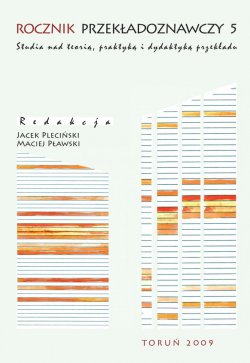Foundations of the process-oriented translation didactics
DOI:
https://doi.org/10.12775/RP.2009.020Keywords
translation didactics, cognitive apprenticeship, training of translators, translation processAbstract
The prevailing objective of this paper is to depict the outlines of translation didactics which emphasizes the dynamic-evolutionary character of the translation process. This is meant to be a counterpoint to the traditional face of translation didactics focusing on the input-output relation, i.e. on the analysis of the translation product. Empirical research into the translation process in semiprofessional translators (e.g. Kiraly 1995, Kusmaul 1995, Tirkkonen-Condit 1996) suggest strongly to create educational contexts which make it possible for translation adepts to experience the complexity of transcultural communication and construct their professional identity. The author delineates the founding principles of Cognitive Apprenticeship, a method of “learning-through-guided-experience” (Collins et al. 1989: 457) how to deal with complex tasks, and tries then to adapt it to the needs of the training in problem solving strategies. Th is form of collaborative learning under the supervision of a translation expert seems to be a good catalyst for the empowerment of semiprofessional translators, a key determinant in the process of enculturation of translation adepts into the expert culture. Empowerment is defined by D. Kiraly (2000: 1), the father of a socioconstructivist viewpoint on translator training, as “acquiring the expertise and thus the authority to make professional decisions; assuming responsibility for one’s actions; and achieving autonomy to follow path of lifelong learning”. As sowing the seed of empowerment is without a doubt one of the major challenges for translation didactics, different empowering approaches should be developed, submitted for discussion and verifi ed in educational practice.
References
Alves, F., 1995, Zwischen Schweigen und Sprechen: Wie bildet sich eine transkulturelle Brucke? Eine psycholinguistisch orientierte Untersuchung von Ubersetzungsvorgangen zwischen portugiesischen und brasilianischen Ubersetze, Hamburg.
Bandura, A., 1997, Self-efficacy: The exercise of control, New York.
Collins, A., Brown, J.S., Newman, S.E., 1989, „Cognitive Apprenticeship: Teaching the Craft s of Reading, Writing and Mathematics”, [w:] Knowing, Learning, and Instruction. Essays in Honor of Robert Glaser, Resnick, L.B. (red.), Hillsdale, s. 453–494.
Detje, F., 1996, Sprichworter und Handeln. Eine psychologische Untersuchung, Frankfurt/M.
Gerrig, R.J., Zimbardo, P.G., 2006, Psychologia i życie, Warszawa.
Holz-Manttari, J., 2001, „Skopos und Freiheit im translatorischen Handeln”, [w:] TEXTconTEXT 15=NF 5, 2, s. 181–196.
Honig, H., 1993, „Vom Selbst-Bewustsein des Ubersetzers”, [w:] Traducere Navem. Festschrift fur Katharina Reis zum 70. Geburtstag, Holz-Manttari, J., Nord, C. (red.), Tampere, s. 77–90.
Kadric, M., 2006, „Strategien einer Ubersetzungsdidaktik”, [w:] Glottodidactica, XXXII, s. 45–57.
Kautz, U., 2002, Handbuch Didaktik des Ubersetzens und Dolmetschens, Munchen.
Kiraly, D., 1995, Pathways to translation. Pedagogy and process, Kent.
Kiraly, D., 2000, A social constructivist approach to translator education, Manchester.
Kusmaul, P., 1995, Training the Translator, Amsterdam–Philadelphia.
Reis, K., 2000, Grundfragen der Ubersetzungswissenschaft . Wiener Vorlesungen, Wien.
Risku, H., 1998, Translatorische Kompetenz. Kognitive Grundlagen des Ubersetzens als Expertentatigkeit, Tubingen.
Risku, H., 2004, Translationsmanagement. Interkulturelle Fachkommunikation im Informationszeitalter, Tubingen.
Rosalska, M., 2006, „Empowerment w kształceniu ustawicznym”, e-mentor 3(15), s. 33–36, URL: www.e-mentor.edu.pl.
Schaub, H., 2006, „Denk- und Handlungsfehler”, [w:] Handbuch der Allgemeinen Psychologie – Kognition, Funke, J., Frensch, P.A. (red.), Gottingen i in., s. 485–493.
Schmitt, P.A., 1997, „Evaluierung von Fachubersetzungen”, [w:] Modelle de Translation. Festschrift fur Albrecht Neubert, Wotjak, G., Schmidt, H. (red.), Hamburg, s. 301–332.
Tirkkonen-Condit, S., 1996, „What is in the black box? Professionality in translation decisions in the light of TAP research”, [w:] Ubersetzungswissenschaft im Umbruch. Festschrift fur Wolfram Wilss zum 70. Geburtstag, Lauer, A. i in. (red.), Tubingen, s. 251–257.
Tischner, Ł., 2002, „Filozof w Syrakuzach”, [w:] Tygodnik Powszechny, nr 28 (2776), 14 lipca 2002 r., URL: www.tygodnik.com.pl/numer/276628/tischner. html.
Weigt, Z., 2003, „Die Translationsdidaktik und das Problem der Integration”, [w:] Deutsch-polnische und gesamteuropaische Integration in Forschung, Lehre und Off entlichkeitsarbeit der (polnischen) Germanistik, Grucza, F. (red.), Warszawa, s. 370–374.
Downloads
Published
Issue
Section
Stats
Number of views and downloads: 594
Number of citations: 0



